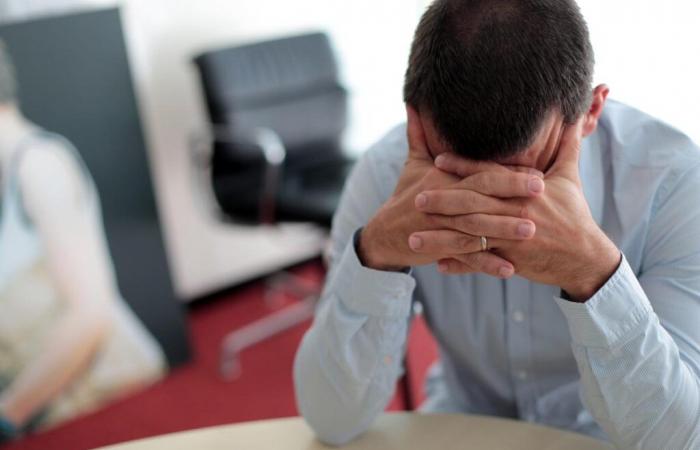Lhe influencers in a good mood 365 days a year set him on fire. “It’s simple on Instagram and TikTok, everyone is always in a good mood,” he storms. In a swimsuit, or in front of a plate of spinach with bulgur carrots. And so? “And so, in real life, no one can be in a good mood all the time. The mood varies. But these variations can be very invasive, particularly in recent years post-Covid, with supporting figures. Periods of depression, blue days, are inherent to the human condition, but at the moment, we are assailed with existential questions, with daily difficulties. And above all we are condemned to respond to an unbearable injunction: good humor. » Professor Pierre Philip, psychiatrist at Bordeaux University Hospital, leads a research team specializing in sleep and mental disorders. He himself is not in a good mood every morning…
Pierre Philip, psychiatrist at Bordeaux University Hospital, heads the Sanpsy Sleep Unit.
Claude Petit / SO
Your book is called “Antidepression”. Is depression an illness, like depression? Otherwise what is the difference between the two?
Depression is a state of gloom which, if it persists for more than three days a week and for two weeks, can become an illness, depression. Depression is not an illness, it is a state totally inherent to all human beings. Clearly, if for more than two weeks you have been sleeping little or poorly, you feel sad, anxious, slowed down, without desire, dark thoughts… you are sick. It is necessary to consult. My book offers assessments and prevention techniques in mental health, before you actually become ill.
Physical activity: a powerful ally against diabetes
No need to embark on a marathon or weight training sessions to feel the first positive effects of physical activity. The important thing is to avoid excessive periods of sedentary lifestyle. To do this, simply take every opportunity to get moving: get up from your chair, talk on the phone while standing, go up and down the stairs, walk actively, etc.
“We are facing an epidemic of sleep debt in France which increases low-grade inflammation in the brain”
You say that depression is inherent to every human being. What are you talking about?
Days without. Days when we get up, we haven’t slept well, we don’t want anything, we feel sad, disillusioned. Mood is like appetite, it fluctuates. We are living in a particularly difficult period to endure, and since Covid, all studies point to proven psychological suffering. I begin in this book by rebelling against the diktat of 365 days at the top, it does not exist, it is a false idea relayed by social networks. Our amplitudes between times when morale is low and times when it is high are sometimes very significant, which becomes difficult to manage on a daily basis. Through this preventive book, I wanted to allow people who wish to be able to reduce this “up” and “down” amplitude.
Yet life continues to generate anxieties, worries, frustrations which legitimize fluctuations in morale. How should we go about regulating our suffering, keeping it at bay?
I’m not changing the world. I am a scientist, I assume that there are biological determinants. Low-grade inflammation and oxidative stress are notably mechanisms involved in the occurrence of depression. These pathophysiological factors of course also play a role in depression. My proposal, in this work, is not pie in the sky, I am not proposing any solution to cure, but a validated method to prevent depression. For example, we know very well today that we are facing an epidemic of sleep debt in France which increases low-grade inflammation in the brain. Maintaining good sleep, with regular physical activity and a balanced diet, is the basis of the six-week program.
Unless we don’t want to get up in the morning to go exercise because we’re too depressed. No ?
Indeed. So we’ll start with a five-minute walk, it’s already a first step against the bumblebee, the blues, the blues. We will work on all the determinants: physical activity, diet, sleep. Simple actions which, combined with each other, will have the power to recover a sufficient level of energy to regulate our mood fluctuations.
“This book is designed as a health record, a weapon of defense”
You present “Antidepression” as a “tool” that can allow everyone to take control of their low morale and ultimately get better. How to go about it?
The first part of the book is a self-assessment, with a basic questionnaire, which everyone can answer, on sleep, diet, socialization, physical activity, life at work, emotional life, etc. Then in the second part, we offer a six-week program where we introduce psychology focuses, which list toxic behaviors, bad habits… Gradually, we lead people to reorganize their daily lives, by setting goals for themselves. towards oneself which will evolve week after week, with a mid-term assessment. This book is designed as a health record, a defense weapon.
Okay, but can we also knock directly on the door of a psychologist?
It’s true, if the situation is encysted, aggravated then yes, you should not hesitate to consult. But before getting there, we can start working on ourselves, by mobilizing every day, thanks to a common thread, which everyone will adapt according to their condition. The latest Public Health France study on the mental health of young people shows that 40% of them say they are regularly depressed since Covid, not all of them knock on the doors of psychologists. First of all, we lack psychologists, and sometimes the obstacles are financial.
Could sleeping, eating healthier and walking be enough to solve part of the problem?
Behind the promise of the book, there is a public health message. Adopting non-medication behaviors is a step yes, indeed. And avoid attacking the mountain from the north face, another step. Walking when you are feeling unwell is a start towards better well-being. To start. We all take blows to the head, but if we find the ability to consolidate our biological base, by stopping clinging to an anchor that makes us dive lower, by preferring the buoy that brings us back to shore, we resist better. and we have the keys to prevention.
“Antidepression”, by Pierre Philip, ed. Albin Michel, €20.90. Ebook, €14.99.







